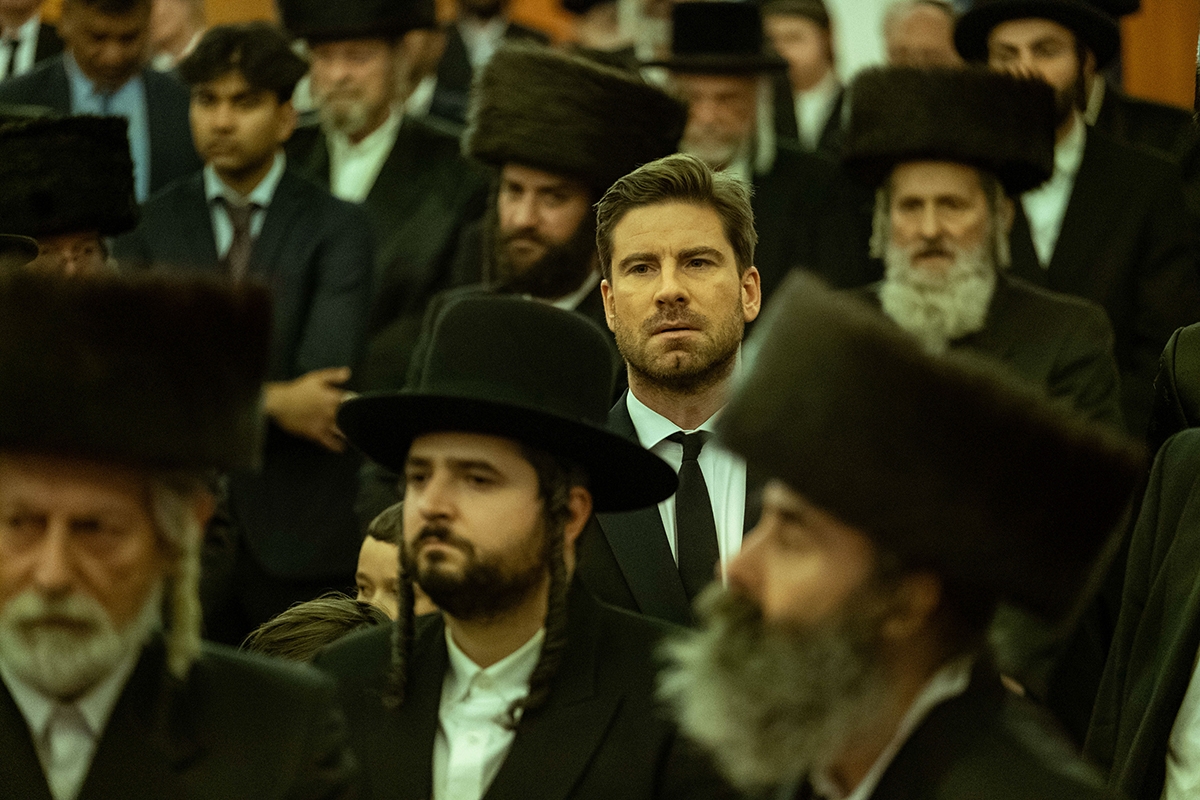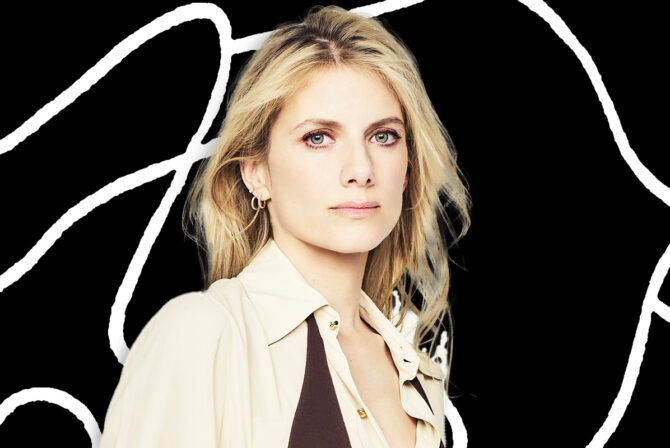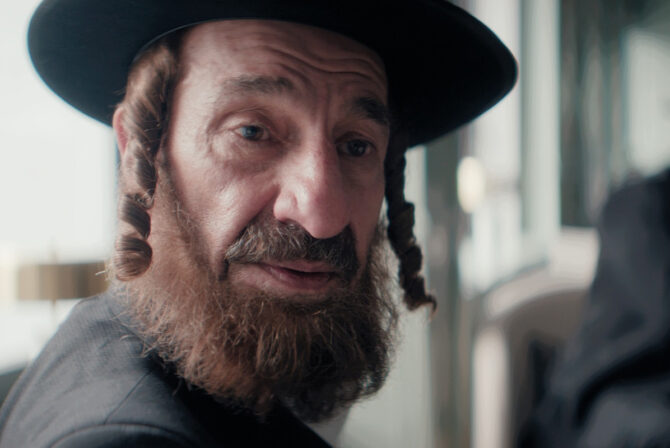Did you know about the Haredi Jewish community of Antwerp? For most of us, the answer to that question would probably be no, followed perhaps by, “Where exactly is Antwerp?” (It’s a Northern Belgian city, close to the Dutch border… the more you know!)
But a new masterful show, “Rough Diamonds,” delves into one of Europe’s oldest and most Jewish communities — one that, despite almost being decimated by the Holocaust, used to account for 80% of the world’s uncut diamond trade — telling a tale of one complex Haredi Jewish family and their long-estranged son.
The show is masterful, mostly because the people behind it are masters of their craft. Director Rotem Shamir and writer Yuval Yefet, who met while working together on season two of “Fauda,” worked with Belgian director Cecilia Verheyden, on this joint production of the Israel’s Keshet International and the Belgian company De Mensen, which has dialogue in Flemish, French, Yiddish and English — sometimes all in one line.
“Rough Diamonds,” which premiered on Netflix in late April and topped the streaming service’s most viewed list, stars Kevin Janssens as Noah Wolfson, the black sheep of the Haredi Wolfson family, owners of a diamond business in the Belgian metropolis. Fifteen years after his departure from the religion and community of his youth, Noah returns home with his son after his youngest brother, in gambling debt, dies by suicide. He finds his family business in peril, facing threats from within and without.
Some have aptly described the show as “Shtisel” meets “Succession,” and while “Rough Diamonds” lacks some of the humor embedded in the latter, it definitely feels accurate. It’s an entrancing show that treats its Haredi subjects with reverence and care, giving us moving portrayals of Jewish ritual and ample Yiddish dialogue. It’s also a show that centers a lot of likable anti-heroes, filled with complex family dynamics and a legacy family business in the midst of a power struggle. Also, like those two aforementioned shows, it’s impossible to turn off. (“Shtisel” has an upcoming prequel set in Antwerp, so the comparison is even more apt.)
Kveller spoke to Shamir and Yefet about the meticulous labor of love behind making this truly unique show.
This interview has been edited and condensed for clarity.
This is the first time I’ve seen Antwerp Jews on TV! How did “Rough Diamonds” come to be?
Shamir: It started off actually with a Belgian producer that thought exactly that — that it’s a very interesting world that never had a spotlight or television show or movie. He met Karni Ziv, the Head of Drama in Keshet, at a convention somewhere and asked her if it’s something that we’d be interested in.
Yefet: That producer and his company realized quickly that they won’t be able to find Belgian writers to write this show, it has to be Jewish writers.
Shamir: I found very quickly that not only is the community itself unique, there’s something very unique happening there. You have so much money, concentrated through this very delicate and ancient craft, in the hands of a very specific community, but it’s been going through turmoil [as the diamond industry] revolutionizes in the last 25 years. The whole thing just felt to us like such an amazing place for a television drama; a specific world that has its own rules, and its own kind morality, and that’s been shaken pretty strongly. When we went to visit there, even before we started writing the show, you can see this in every corner; you can hear it in the little conversations that you have with people on the streets. People need to reinvent themselves, families are going through turmoil, companies are falling apart, and all that really resonated to us as a really good place to write a television show. Regardless of the fact these are Jews.
I spent five years growing up in Belgium. I speak French, not Flemish, unfortunately, but watching the show was very familiar, because I’ve heard a lot of Flemish growing up.
Shamir: I’ve heard a lot of Flemish and it doesn’t sound familiar to me at all. It’s a really hard language.
Yeah, it is a really hard language! I think not a lot of people even know that it exists. You went and wrote a show that has a ton of Flemish, which I assume not many of its viewers speak. What was that process like?
Yefet: Well, the show was written in English. I think that the main challenge was for Rotem on the set, because when we discuss the show, on a script level, everybody’s just speaking English. There are parentheses in the script, saying, “now he says this in Yiddish, he says this in Flemish, in French.” In the rehearsal and in the shoot itself, it started to become clear that it’s a festival of languages. It also was very important to us to try and show in that community, and in that business, they speak multiple languages, and they kind of switch between languages in a natural, organic way. I don’t think I’ve ever encountered anything like this in my life.
I noticed them switching between Flemish and Yiddish a lot, peppering a word here and there, mid-sentence! From the Yiddish side, how did you make sure that the dialogue was authentic?
Yefet: We had translators and someone that did the quality control for each language in the script. The actors that we brought from Israel, like Dudu Fisher, Yona Elian, Amitai Kedar, Mendy Cahan, Odeya Koren, they were cast also because they either spoke, or had some access to, Yiddish. On the Belgian side… it was more complicated.
Shamir: Our Yiddish consultants and teachers first had these basic level lessons with Flemish-speaking actors, and then they would go into pronunciations to the point that they will record, word by word, sentence by sentence. I think what we did learn is that there are many types of Yiddish accents, which is OK, because one person would learn Yiddish from his German mother, and another one learned from his Flemish mother. So that characterized the different Yiddish speaking characters in the show.
Yefet: I really have to salute the actors for doing such great work with Yiddish, because it’s very, very hard to do dramatic scenes where you’re also thinking about saying a language that you learned phonetically. I think they did it beautifully.
What was the casting process? Can you bring someone that has any kind of lived experience with this community, that’s pretty insular, into a show like this?
Shamir: In terms of casting someone from that community in Belgium, that’s really not an option — there is perhaps one or two Jewish actors and although our lead, Kevin, did a DNA test and found that he’s like 2% Jewish and is very excited about that, there are hardly any Jewish actors there.
I will say that Kevin was Yuval’s and mine’s first choice. We pushed for him from the beginning because we thought that he has not only this star quality, but this amazing kind of emotional ability. In Belgium, he’s known for his chameleon abilities. Every role that he does, it’s a completely different look and a completely different character. Although Noah was the straight man in the palette of characters in “Diamonds,” we knew that we wanted somebody that can carry this emotional journey from the get go. Kevin was that guy for us from the beginning.
What kind of research did you do to make sure that you’re portraying the community in an authentic way?
Yefet: We flood ourselves with information. We basically visited time and again and we met a lot of people. We developed relationships with people from the community, and from the diamond industry. So it’s not that we wrote the entire show, and then showed it to some advisor to see if it’s right.
Then there’s the whole production side, where each department — art, wardrobe, makeup — have their own advisors, and they would ask them for specific information that’s relevant for them. Then you have the shooting phase where there were advisors that are mostly on set when it’s something very relevant to the community, like a wedding or Jewish dinner, who were there to shape things in the right way. Throughout the whole process, we had like 10 eyes of consultants looking at the material and making sure that we’re getting it right.
Yefet: We were even lucky enough to have an Israeli editor, Joelle Alexis, who is one of our top editors in Israel.
I put her name in Google to see if she edited any TV series, because I know her from the films of Shlomi Elkabetz, and Google said, “Joelle Alexis, editor born in Antwerp.”
Oh, wow.
So she had both languages.
Especially for the Flemish team, for Cecilia, their thirst to learn and their obligation to accuracy was second to none, because they felt like they’re doing something important in making this as accurate as possible.
It’s also an international show about Jews and money, and because it’s on Netflix, it’s not necessarily just for a Jewish audience. That’s a bit of a minefield! How did you think about that aspect when you were making the show?
Yefet: Oh, we love money!
*laughs* I know, right…
Yefet: In all seriousness, I think it was very important for us to be mindful of that. That’s one of the reasons there is no greed in the show. It’s all about survival, or preserving the legacy of the family.
Shamir: Eli [the eldest Wolfson brother] is a character that acts in the most kind of [greedy way] — taking over the company. But early for us writers, he was the most lovable characters, because we were constantly trying to understand him, psychologically. The things that motivate him go back to him feeling like the less loved brother, the person whose father didn’t really pamper him, the person who was left out of the game. So nothing that he does comes from this idea of “I just want money for myself, I just want to become the richest person.”
Yefet: Matthew Weiner in “Mad Men” said that we all want to be Don Draper, but we’re all Pete. I think it’s the same here. We look at someone like Noah, this strong badass who solves situations. That’s not most of us. Most of us are Eli. He’s a very flawed character, but we identify with him so much.
Shamir: I think Robbie [Cleiren] plays Eli brilliantly — he put so much emotion in that character, you can’t end the show without feeling a little bit of sorry for him. You want to take him under your wing in a way. You don’t end up hating him, that’s for sure. It connects the audience with Judaism and business, which is, like you said, a minefield, through the heart and through emotions, and it gives you hope and a release of those kind of thoughts and stereotypes.
Is antisemitism a driving force in this community? Was it something you talked about, about its place in the show?
Yefet: Well, that’s a good question, because there is antisemitism in Belgium. Yet, early on, we decided that making the show about [antisemitism] is not something that’s organic to the story. We don’t want to victimize our characters; we want to put them in a place where they have choices and they control their fate. They have forces that are fighting against them that are the same as the forces that are fighting against any family in this situation. It would be, I think, reducing them if the forces against them are antisemitism.
That said, there are undertones of antisemitism in the antagonistic character of Smets [a local prosecutor played by Els Dottermans, who goes after the Wolfson family], which we were very careful to connect to the specific personal history of her family.
It was important for us to keep a little of that because it’s very, very true to life. We couldn’t paint a picture where no Belgian in the show has undertones of antisemitism. So it’s there, but in very, very nuanced way.
Right, it’s not a central force in the show.
Yefet: Yeah, but, you know, we had a little victory moment in the first episode [in the scene where Noah physically slams a man who his brother owes gambling money to, and who says derogatory things about Jews]. We thought, it would be nice to have this strong Jewish character who acts a little bit like your classical movie hero and reacts in this cool way when he’s being cursed.
It’s nice to see someone who obviously has antisemitic sentiments…
Yefet: Getting his ass kicked!
We don’t get a lot of Jewish action heroes.
Yefet: That’s why we love a Wonder Woman.
Is there anything important that you’d like viewers to take from this show?
Yefet: I think it’s important for us that they look at these people that are like “the other” and see that they have the same problems like everyone else. That’s the way we felt, as non-Hasidic Jews, looking at these this community. We realized that they’re not that different from us.
Shamir: We always said this is not a show about Jews. It’s a show but people that happen to be Jews. It’s about their turmoils, their fears, their passions, their wants and needs. It’s just a show about people. That’s all it is.








